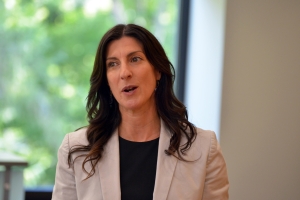
Faculty Profile: Sarah Gottlieb Sarah Gottlieb is Assistant Clinical Professor of Law and Director of the Criminal Justice Clinic.
Sarah Gottlieb joined W&L Law in 2024 as the director of the Criminal Justice Clinic. Previously, she was a clinical teaching fellow in the Innocence Project Clinic at the University of Baltimore School of Law.
Prior to her academic career, Professor Gottlieb spent eight years in the Maryland Office of the Public Defender, most recently as an assistant public defender in the felony division, where she represented hundreds of defendants at bail review hearings, suppression hearings, and trials. She began her career in criminal defense representing indigent defendants at the Committee for Public Counsel Services in Springfield, MA.
“I always wanted to be a public defender,” said Gottlieb. “I went to law school because of my interest in criminal law. I was always passionate about wanting to defend people, particularly people who could not afford attorneys.”
Gottlieb’s interest in justice work was planted early. Raised in Lawrence, Kansas, Gottlieb was inspired by her father, who had also begun his career in public defense and once helped exonerate a client in what was among the first uses of DNA evidence. “In sixth grade, I wrote a report on it,” she said. “I still have it.” Gottlieb explained she was really struck by how this new DNA science exposed the fallibility of eyewitness identification.
She attended Boston University for her undergraduate degree, majoring in art history and sociology. Her sociology coursework was focused on the criminal legal system and how poverty and socioeconomic status impacts individuals charged with crimes. She also studied abroad during this time, which allowed her to study how different countries approach criminal justice. “Mass incarceration is a uniquely American problem.”
After law school at Boston College, she spent a decade pursuing her passion for public defense work before a new calling began to take shape. She became a mentor to younger attorneys and law students in her Baltimore office, helping them develop practical skills as well as the mental fortitude to manage what can be a demanding and stressful job. “I loved doing that so much, but you don’t really have time to do that and also manage a full caseload. So that’s what led me into teaching.”
Gottlieb began her academic career in 2021, taking a fellowship with the Innocence Project Clinic at the University of Baltimore, where she spent three years representing wrongfully convicted individuals and teaching law students. There, she also began to develop her scholarly focus, evaluating the efficacy of criminal legal reforms. Her first paper “Progressive Facade: How Bail Reforms Expose the Limitations of the Progressive Prosecutor Movement” challenged the notion that reforms will come from those whose very role it is to incarcerate. Her new paper, forthcoming in the Colorado Law Review, continues this exploration by showing how conviction integrity units in many prosecutors’ offices are failing to conduct sincere review of innocence claims or address the causes of wrongful convictions.
“The criminal legal system is set up to be a certain way. So even when you have prosecutors pushing against it to change it, quite often, it pushes right back,” she explained.
Gottlieb just completed her first semester directing the Criminal Justice Clinic, which allows students to represent clients facing misdemeanor charges and pursue post-conviction relief for incarcerated individuals. The work offers students a full view of the criminal legal system, from the initial charging decisions to the long-term consequences of incarceration. The addition of post-conviction work is new, and Gottlieb sees it as vital to both student development and community service.
“The students see the real impacts of mass incarceration for our clients today, but also get to represent clients in what people really consider more minor cases, even though they have extreme collateral consequences,” she explained. “They get the full picture.”
Students under her supervision represent clients throughout the Shenandoah Valley, including in Roanoke, Staunton, and Lexington. In addition to courtroom advocacy, clinic participants engage in deep, holistic representation that includes mitigation work and client storytelling. “We’re looking at the client as a whole person, not just their charge,” Gottlieb said.
That perspective, she noted, is often eye-opening—and difficult—for students. “The injustice that you encounter, both in district court and in reviewing these post-conviction files, is something that’s really hard to struggle with at any level,” she said. “I’ve been really inspired by the students this semester. They’re so innovative in the way that they investigate and defend our clients.”
As she looks ahead to her second year at W&L, Gottlieb is eager to build on that momentum. She plans to deepen collaborations with other clinics, expand expungement work, and continue growing the community of W&L students and alumni passionate about public defense.
If you know any W&L faculty who would be great profile subjects, tell us about them! Nominate them for a web profile.
 Professor Sarah Gottlieb
Professor Sarah Gottlieb
You must be logged in to post a comment.